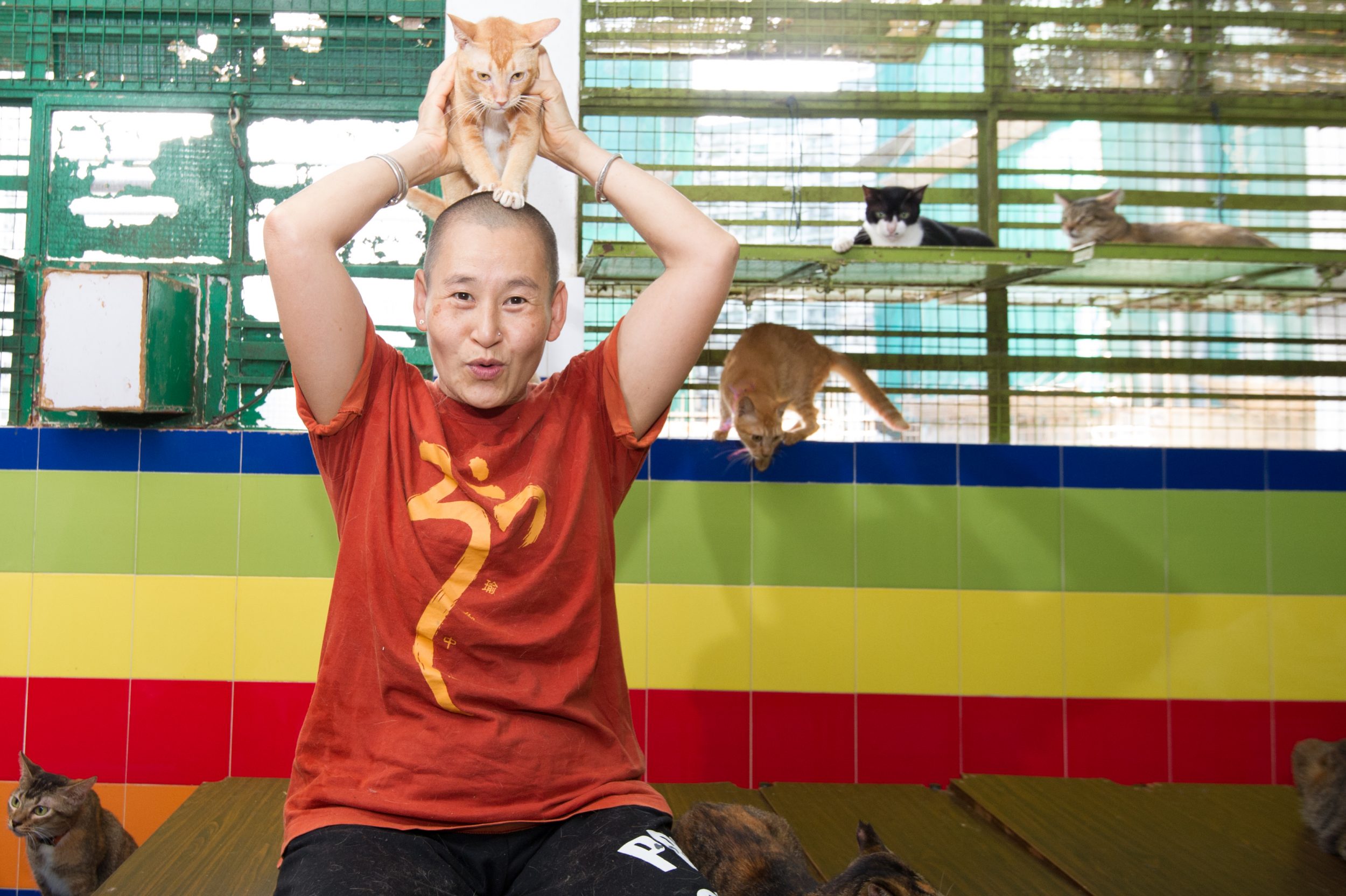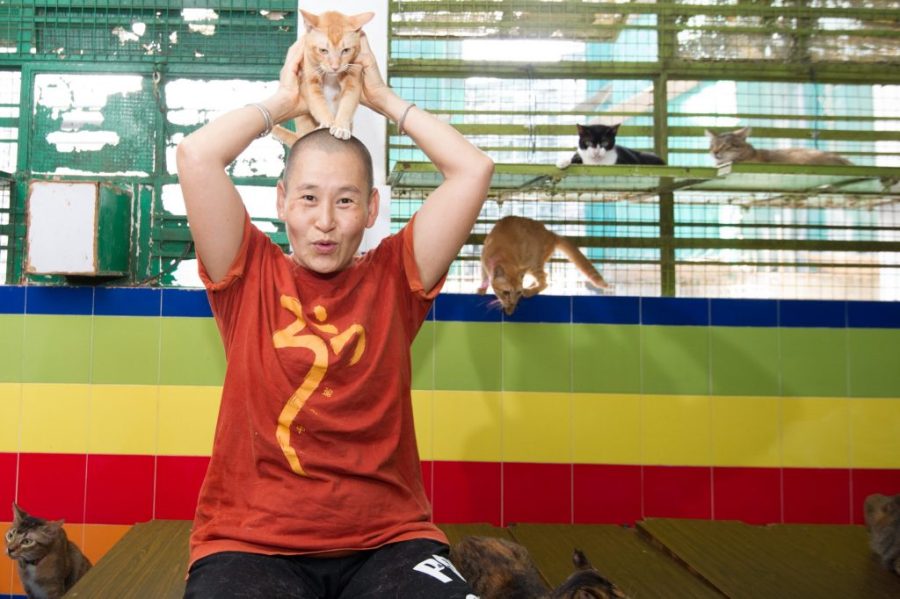Yoko Choi is the Founder and President of the Abandoned Animals Protection Association of Macau (AAPAM). She speaks fluent Cantonese, conversational English and basic Japanese.
Born on 16 July 1964, Choi spent much of her childhood in a village house with six siblings and a menagerie of pets; growing up she has cared for everything from cats and dogs through to fish and turtles. Her parents ran a small restaurant, which provided the income to care for this big family.
Although she’s always felt a strong bond with animals, as a teenager Choi never thought she’d one day become devoted to animal rescue. “I went straight to Tokyo after finishing high school in 1986, because I wanted to train as a traditional Japanese pastry chef,” she recalls. “But after two years holding down multiple part-time jobs there, I was still unable to save enough to cover the expensive training fees, and so I had to give up.”
In 1989, Choi joined her sister in Leeds, England, where she took a one-year English language course. The next year Choi returned to Macao and earned a living here by teaching Japanese and aerobics. She also developed a keen interest in yoga and after years of self-practice, obtained an instructor license from the Sivananda Yoga Vedanta Centre in London in 2002.
Choi’s first animal rescue happened not long after she returned from London and became a yoga teacher in Macao. “During a yoga class I was teaching, I received two separate calls from friends, telling me about a St. Bernard that had just been sent to the Macao Municipal Kennel for the fourth time due to her size and skin problem,” she says. “They thought that I could provide her a perfect home because my apartment had a rooftop.”
Choi hurried to the Municipal Kennel after work and found that the dog was even bigger than she’d expected. “She was like a pony,” she recalls. However, it didn’t take her long to make up her mind. “I was determined to give her a permanent home. The most amazing thing was, after I took her home, her long-term skin problem subsided. She remained healthy and happy for a very long time.”
After homing the St. Bernard, Choi became more and more involved in animal rescue. This led to meeting like-minded animal lovers such as Josephine Lau, who later became Vice President of AAPAM. They formed a group of rescue volunteers, which provided temporary shelter for stray animals, matching them with suitable adopters. However, very quickly the volunteers’ apartments became overcrowded. “When we realised that Macao had many more homeless animals than we’d imagined, we decided that it was time to set up a real animal shelter,” she says.
Choi and her friends first rented a space in a remote location in Coloane, but issues around facilities and location quickly made them consider relocating.
“Josephine and I paid a visit to Society for Abandoned Animals, an experienced animal rescue and adoption organisation in Hong Kong. Their ‘no-kill’ principle is very close to our beliefs, so we decided to replicate their operation style in our new shelter.”
Choi established AAPAM with her like-minded friends in October 2004, after moving all the animals into a factory space in Macao. With improved facilities and a better location, the association then began campaigning to raise public awareness on animal welfare. This included developing an animal sponsorship program and launching an annual Canine Carnival, which offers a fun day out for owners and pets to play games together.
The association is also well known for its relentless efforts to urge for the establishment of an animal protection law in Macao. It all began in 2008, Choi recalls, when 11 teenagers were brought to the police station for burning a stray cat. “They only gave a statement in the police station and nothing happened afterwards. We thought this was unacceptable, so we quickly held a press conference and staged the first protest to demand an animal protection law.”
According to Choi, the government had forewarned the association that the people of Macao would be unlikely to take interest, “because it was only about animals.” But, to everyone’s surprise, hundreds of local citizens, many bringing along their own pets, congregated for the protest.
“Over 500 people joined the protest that day,” Choi enthuses. With the continued support from local animal lovers, AAPAM organised protests every year. By 2013, the protest was joined by a record number of 2,000 people. “The demand was so huge that the Chief Executive of Macao [Chui Sai On] had to call for a meeting with us on the following day to discuss the issue,” she reveals.
Eight years later, in 2016, Macao’s first animal protection law was eventually enacted, with the purpose of prohibiting animal abuse and abandonment, and tackling irresponsible pet ownership. This was a great first step, but now Choi believes it is important for the government to closely watch over how the law is executed and can be improved upon.
“I am often stopped by people on the street who recognise my face from the protests. They complain that government officials are always fining owners who do not chain their dogs outside. They think that the law is for punishing the owners but not the animal abusers,” she highlights. “No laws can make everybody happy, especially at their beginning, but at least we’ve made the first step.”
Currently AAPAM is home to approximately 400 animals, mainly cats and dogs. Many animals continue to be helped by the organisation, but AAPAM still faces challenges, with rising costs and a new need to relocate. Despite the difficulties ahead, Choi remains optimistic about the path she follows.
“We are just normal people, but we have managed to come so far and overcome many obstacles. I believe when you really put your heart into something, people will be touched by your passion and offer their support. I just hope that one day, Macao will stop needing associations like AAPAM because people will have developed a better sense of responsibility, and stop abandoning animals in the city.”






